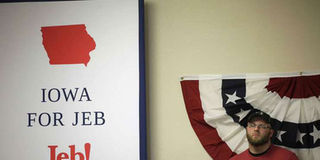Registrar of Societies misused his discretion

A man in a Atheist tee shirt listens as Republican presidential candidate Jeb Bush speaks during a campaign event at the Cedar Falls Eagles Club January 30, 2016 in Cedar Falls, Iowa. The Registrar of Societies wrote to a group calling itself “Atheists in Kenya” indicating that the State would not register the group. PHOTO | AFP
What you need to know:
- The Registrar of Societies wrote to a group calling itself “Atheists in Kenya” indicating that the State would not register the group because there is “cause to believe that the interests of peace, welfare or good order in Kenya would be likely to suffer prejudice by reason of your registration as a society”.
- Firstly, that he had cause to believe that the interests of peace in Kenya would likely suffer prejudice should this group be officially recognised.
- The second insinuation by the registrar is that registration of “Atheists in Kenya” would endanger the “interests of welfare” in Kenya.
- Finally, the registrar suggests that the group’s existence endangers good order in Kenya.
Last week, a curious incident occurred that might have major ramifications for the freedom of association in this country.
The Registrar of Societies wrote to a group calling itself “Atheists in Kenya” indicating that the State would not register the group because there is “cause to believe that the interests of peace, welfare or good order in Kenya would be likely to suffer prejudice by reason of your registration as a society”.
The group has been vocal in the media and in the courts seeking to stop the government from recognising and participating in religious occasions, citing the constitutional injunction that “there shall be no State religion”.
Atheists are a minority in Kenya. At the last census, about 2.5 pc of Kenyans indicated that they had “no religion” as opposed to the majority who indicated that they belonged to any of the dozens of religious denominations found in this country.
It is, therefore, reasonable to conclude that a majority of Kenyans would find it abhorrent to register a group of atheists whose main role would be to criticise their beliefs and perhaps even denigrate their gods. What is strange is to elevate this degree of dislike to State policy.
Let us attempt to deconstruct the letter from the registrar giving the main reason why the group could not be registered.
SUFFER PREJUDICE
Firstly, that he had cause to believe that the interests of peace in Kenya would likely suffer prejudice should this group be officially recognised. What does this mean? Does it mean that atheists, as a group, are particularly violent fellows who would cause war and destruction in this country should they be registered?
If this is the case, it beats reason why they would be allowed to publicly declare that they are atheists without being quickly apprehended and incarcerated for threatening the peace!
On the other hand, perhaps the registrar is suggesting that he has refused to register the group in order to protect its members from the wrath of the religious majority. If this is the case, is he suggesting that Kenyans are so unruly and uncultured that they are unable to tolerate varied viewpoints in matters of religion?
Or that the security agencies would be overwhelmed by the few violent religious zealots who would feel moved to mete out punishment to members of an atheists’ association should it be registered?
The second insinuation by the registrar is that registration of “Atheists in Kenya” would endanger the “interests of welfare” in Kenya. This suggests that the country would be the poorer should this group gain recognition.
This can only be explained by individual prejudice against those that do not profess belief in any gods or “supernatural” beings. That this prejudice can be allowed to guide a State agency in decision-making is a demonstration of just how far away from the trajectory of freedom we have strayed, and there is no telling where this misuse of discretion will end.
EXISTENCE OF DIETIES
Finally, the registrar suggests that the group’s existence endangers good order in Kenya. This would be funny were it not so tragic.
If public order in this country is only maintained by denying such groups registration, then one would be correct to venture that there is no such order in the first place. A society whose orderly existence is threatened by a few people shouting that there are no gods and that religion is superstition is obviously built on quicksand.
There are many arguments for and against the atheists’ position that does not recognise the existence of deities, but none of these arguments have the force of law or government policy.
They ought to remain privately held convictions that must not be foisted upon the rest of the citizenry.
Even the most bigoted religious zealot must acknowledge that refusing to register the atheists’ group only serves to popularise their cause and contributes more to disrupting the peace than allowing them to operate freely like other religious and non-religious groups.
The long and short of it is that the government must remain agnostic as far as religious discussions are concerned.
Atwoli is associate professor of psychiatry and dean, School of Medicine, Moi University; [email protected]





